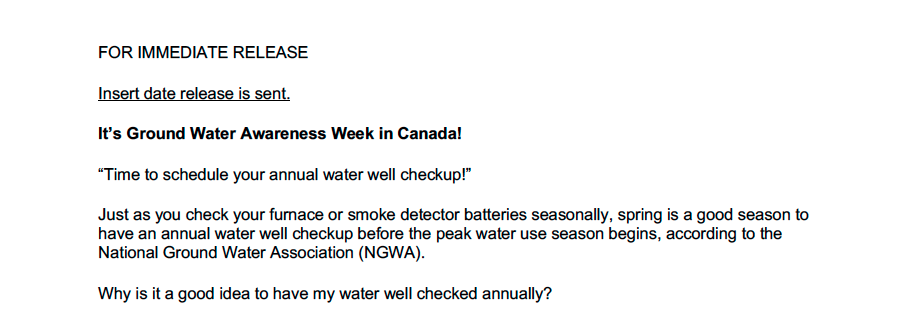
News
Press release template helps raise ground water awareness
March 6, 2016 By National Ground Water Association/Ground Water Canada

Westerville, Ohio, and Simcoe, Ont. – The National Ground Water Association has provided a template for a sample press release water well contractors and other ground water stakeholders can use to raise awareness of ground water and put themselves forward in the community as skilled and trusted professionals.
The text below can be customized, cut and pasted into a Word document to be shared with print, broadcast and web media organizations. At the bottom is a PDF version (note Word documents are easier to handle for most organizations).
FOR IMMEDIATE RELEASE
Insert date release is sent.
It’s Ground Water Awareness Week in Canada!
“Time to schedule your annual water well checkup!”
Just as you check your furnace or smoke detector batteries seasonally, spring is a good season to have an annual water well checkup before the peak water use season begins, according to the National Ground Water Association (NGWA).
Why is it a good idea to have my water well checked annually?
An annual checkup by a qualified water well contractor is the best way to ensure problem-free service and quality water, says name of well-drilling company or other water professional.
Also, preventive maintenance usually is less costly than emergency maintenance, and good well maintenance – like good car maintenance – can prolong the life of your well and related equipment. NGWA further recommends you test your water whenever there is a change in taste, odour, or appearance, or when the system is serviced.
Schedule your annual water well checkup
Wells can provide high-quality drinking water, and about a third of Canada’s population depends on ground water for domestic use. But with well ownership comes the responsibility of keeping the water well in good working order. A check of your well by a qualified water well contractor may include:
· A flow test to determine system output, along with a check of the water level before and during pumping (if possible), pump motor performance (check amp load, grounding, and line voltage), pressure tank and pressure switch contact, and general water quality (odour, cloudiness, etc.).
· A well equipment inspection to assure it’s sanitary and meets local code.
· A test of your water for coliform bacteria and nitrates, and anything else of local concern. Other typical additional tests are those for iron, manganese, water hardness, sulphides, and other water constituents that cause problems with plumbing, staining, water appearance, and odour.
Last name of individual or company also recommends that well owners:
· Keep hazardous chemicals, such as paint, fertilizer, pesticides, and motor oil far away from your well, and maintain a “clean” zone of at least 50 feet between your well and any kennels and livestock operations.
· Maintain proper separation between your well and buildings, waste systems, and chemical storage areas.
· Periodically check the well cover or well cap on top of the casing (well) to ensure it is in good repair and securely attached. Its seal should keep out insects and rodents.
· Keep your well records in a safe place. These include the construction report, and annual water well system maintenance and water testing results.
For more information, call full name of member, company, and phone number.
Sample press release (PDF version)
Print this page